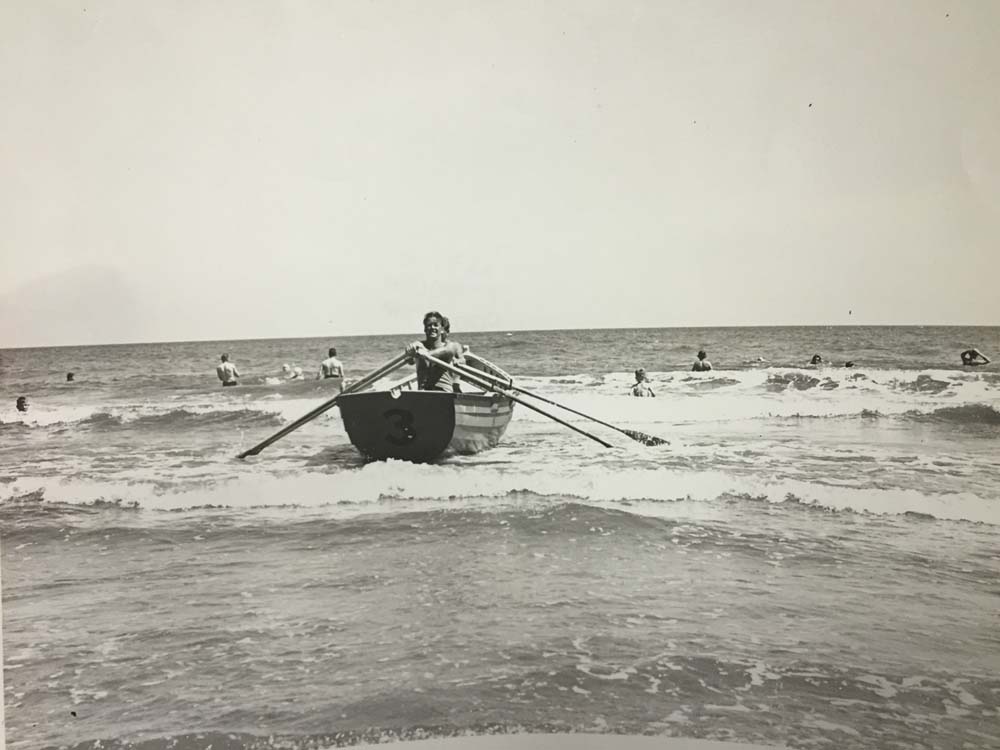He was a lifeguard in Wildwood and he and his rowing partner had almost won the South Jerseys the week before he enlisted, an amazing performance for two rookies who had never rowed together before that 1942 season. But they were big and strong and smart and rowed like one man, maybe because they’d played three sports together in high school.
He’d just graduated, like he’d promised his parents he would before joining up, and they reluctantly signed the enlistment papers because he was still only 17. Timmy, his partner, was already 18, and they’d decided they’d go in the Marines and stay together as long as they could. There was no “buddy system” then. The country had been caught woefully undermanned to fight a world war, and even the Marines were pushing recruits through abbreviated, breakneck training to bring the ranks up to the numbers needed. If he and Timmy got separated in the shuffle, so be it. Chalk it up to the newly popular saying, “Don’t you know there’s a war on?”
And the gods of war smiled on them, at first. They breezed through basic training at Parris Island, together in the same platoon. They even got a 10-day leave before shipping out from San Diego, and they came home and spent a week on the beach, rookies now in name only.
Their relatives saw them off on the train to Philadelphia, and amid the hugs and tears and clasped hands there was the strained air that always accompanies sending young men off to fight. The fortunes of war, unfair and uncaring, were now in play. The deadly game had begun in earnest. Fate was the captain of battle and blood was the coin of that lethal realm.
The Third Marines were the tip of the spear that pierced the nightmare jungles and scaled the unforgiving slopes of Guadalcanal, a blasted speck in the endless Pacific. They faced a fanatical enemy, well-trained and provisioned, the eager youth of a Samurai military culture whose highest values were honor and death. The fighting was savage and unforgiving, no quarter asked nor given.
And he and Timmy survived that inferno; their rifle company suffered almost 70 percent casualties, but they were finally replaced and limped to the rear, their eyes at the distance of those who have looked into the hell of combat.
They licked their wounds in garrison, and trained the replacements that arrived daily. He and Timmy were old heads now, and kept their distance from the recruits. Friends died too easily out here. They sensed how fragile their own friendship had become, as if hardened to a breakable edge by the furnace of combat. They knew the odds now.
Then it was on to Bougainville, a dot in the Solomon Islands, and it was there that the sand in the glass of war ran out. Timmy was a heartbeat behind him in getting into their foxhole when the first mortar round came in.
That’s all he remembered. He woke up three days later on a hospital ship; he had been concussed so badly that the field doctors at first thought he was in a coma. The world now was strangely silent after the tumult of battle, and then he realized he was deaf. He cried out into the silence and heard nothing, only felt his voice on his tongue and in his throat.
Both his eardrums had been punctured, and he was being shipped back to Schofield Barracks at Pearl Harbor and light duty while he regained his hearing.
Of Timmy, he could find out nothing, at first. He roamed the silent ship, looking for a familiar face among the wounded who might know Timmy’s fate. There was nobody. None of the medics or doctors knew anything either.
Finally at Pearl Harbor, he went through the travails of long-distance calling to reach Timmy’s parents, and from them he heard the terrible news: the mortar shrapnel had mutilated Timmy’s legs so badly that they had been amputated below the knees at a field hospital on Bougainville, and he was currently in a veteran’s hospital in San Diego undergoing rehabilitation and being fitted with prosthetic legs.
In Hawaii, his hearing recovered, he was spared any further combat, although he was in a unit at Schofield Barracks training for the invasion of Japan when the atomic bombs were dropped.
It was another six months before he was mustered out, and he was back in Wildwood and on the beach again for the 1946 season. He seemed essentially unchanged, but quieter. He didn’t laugh as easily in the guard shack or play any lifeguard antics. He talked on the phone to Timmy, still in hospital in San Diego, regularly and they’d planned to go out for a row once Timmy had fully mastered his new legs and was back home.
On a sunny morning in July, he was just coming out of the headquarters shack when he heard a familiar voice.
“Great day for a row, man!”
Timmy was walking toward him in a stiff-legged gait. He wore sneakers, khaki pants, and a white tee shirt. They embraced and beheld each other.
“Check this out,” Timmy said and raised a pantleg to show him a shiny artificial leg. “Now let’s get out there.”
Timmy had been a trifle awkward getting seated and arranging his oars in the locks, but he still rowed with the same power. They paused beyond the breakers, bobbing in the current, listening to the water and the gull cries.
“I thought of this every day,” Timmy said. “It kept me going.”
And for that bright and perfect time, in that boat, under the endless sky, they were forever young and there were no wars.
Memento Mori
Categories
Archives

